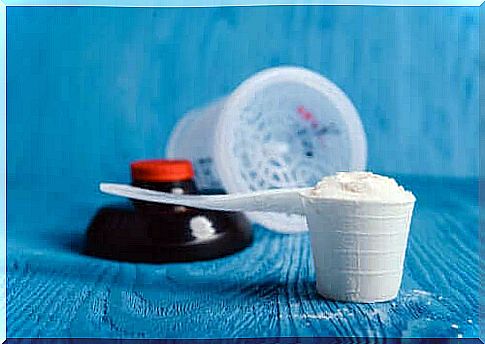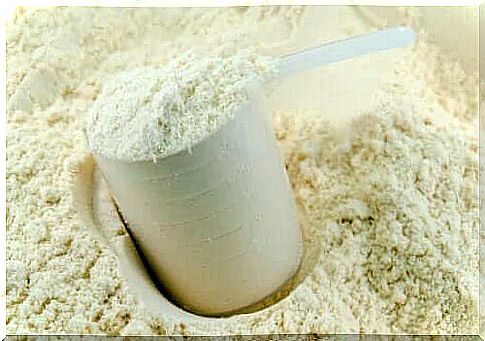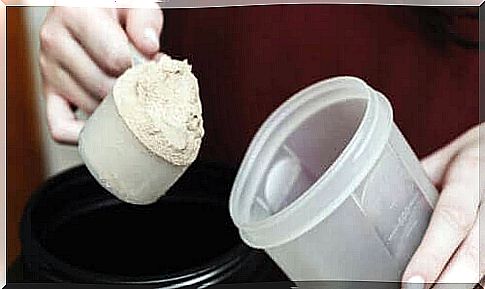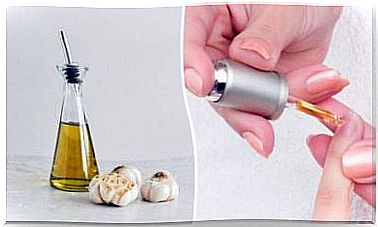Characteristics And Applications Of Calcium Caseinate

Have you ever heard of calcium caseinate? It is a substance obtained from dairy protein. Do you want to know what it is for? Then read on to find out.
Calcium caseinate is a casein compound with a high biological value. In this regard, it is quite popular as a dietary supplement among athletes, especially in sports that stimulate muscle synthesis.
What exactly is calcium caseinate?
As we mentioned a bit above, calcium caseinate is a salt made from the extraction of milk protein.

In general, this process is carried out by adding specialized enzymes, or using substances such as vinegar and lemon juice. These are in fact able to lower the acidity of dairy products and to solidify casein. As you can see, this kind of salt comes from treating casein with calcium hydroxide.
Properties of calcium caseinate
This substance contains about 90% of its weight in proteins, as well as all essential amino acids. The high biological value is due to this and they also contribute to the nutritional qualities.
In addition, it contains a significant amount of calcium and less than 1% fat. It also contains phosphorus and sulfur in limited amounts. In addition, it basically does not contain lactose.
In general, caseinates are heat resistant substances, even more so than most proteins. In addition, they can easily react with water and fats and are therefore powerful emulsifiers.
As you can see, it is all these properties that make these salts very versatile as food additives in various edible products.
Applications of Calcium Caseinate
The best-known use of this compound is as a sports supplement. This is because casein, a protein, has an anti-catabolic effect. This means that it prevents muscle breakdown.

The body absorbs this substance slowly after ingestion and during its digestion activates the metabolism of amino acids, along with the synthesis of proteins. As you can see, its consumption leads to a feeling of satiety.
Several studies (Spanish link) have found that the contribution of serum proteins and caseinates is useful in achieving a feeling of fullness in obese people. It is also well suited to cover the protein recommendation in hospitalized patients with a higher need for this nutrient.
Because it is a dietary supplement, it is also useful for those who do strength exercises, train intensively, or are looking for muscle definition. In general, its consumption is recommended before bedtime or after training.
However, it is not recommended to take it without consulting a qualified professional. This is because the current diet must be taken into account when ingesting. Keep in mind that it doesn’t produce any of the listed effects on its own, especially if it’s not supported by the recommended protein intake.
Use in the food industry
Caseinates are used in foods, and in other additives and preservatives. This salt is intended to extend the shelf life of various products, give them nutritional value and change the texture. It is used for, among others:
- ice
- cookies
- bread
- instant soup
- coffee creamer
- breakfast cereals
- pastry and cake

Calcium Intake
Since it consists mainly of calcium and contains a minimal amount of lactose, this substance can provide calcium to people who are lactose intolerant. They can digest it without any problem. This is great because it counteracts decalcification and helps strengthen bones and teeth.
Contraindications
Several studies (Spanish link) indicate that casein has significant inflammatory potential so that some individuals may be allergic to it and also to its derivatives.
casein allergy
An allergic person’s body identifies this protein as a foreign substance and releases histamine to neutralize it. This leads to reactions such as:
- diarrhea
- irritated throat
- stuffy nose
- burning eyes
vegans
This substance comes from cow’s milk and is therefore not suitable for people who follow a vegan diet or who do not consume dairy for any reason. Therefore, they should read labels carefully and make sure that the products they consume, such as coffee, soup or cookies, do not contain calcium caseinate.
Final Notes on Calcium Caseinate
This substance is popular as a food additive in various products that you consume on a daily basis. In addition, it is also a sports supplement that you can include in your diet if you are trying to improve your muscle mass.
Keep in mind that you should consult an expert to make sure there are no contraindications before adding it to your diet.








